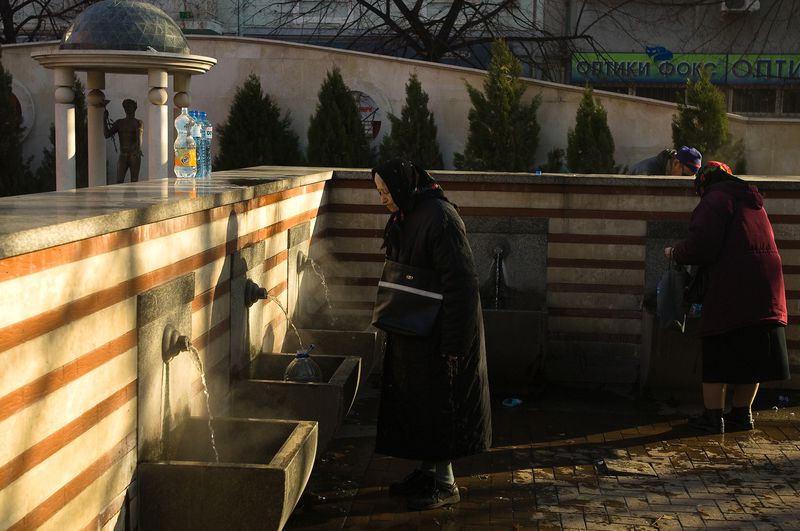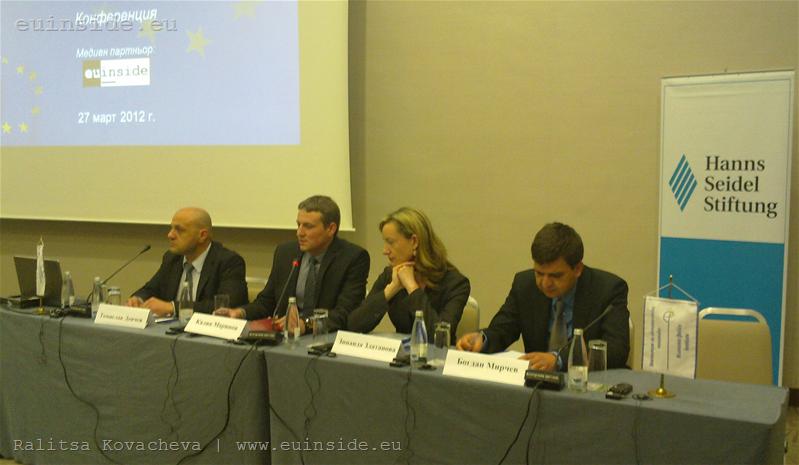Parallel Bulgaria
euinside, April 4, 2012
 The parallel Bulgaria is not the country of “statistical average” that unalterably occupies the bottom places in European rankings for standard and quality of living. It is also not the country of the politicians and oligarchs that the government affiliated media obligingly strive to bring closer to its “statistical average” twin. The parallel Bulgaria is the country of people who by their own choice do not join either of the two categories.
The parallel Bulgaria is not the country of “statistical average” that unalterably occupies the bottom places in European rankings for standard and quality of living. It is also not the country of the politicians and oligarchs that the government affiliated media obligingly strive to bring closer to its “statistical average” twin. The parallel Bulgaria is the country of people who by their own choice do not join either of the two categories.
Where is the civil energy?
They are well educated, well informed, well reasoning, professionally active and ... determined to benefit from the advantages of Internet in order to say what they think. The total number of these people is less than 100 000 (according to a 2009 study [in Bulgarian] of the New Bulgarian University). Constantly active in online opinion sharing are only 500 to 3000. Those are Bulgarian bloggers. People with various occupations and experience, usually established professionals, the bigger part of the active bloggers in Bulgaria are individuals with position and responsibility to their environment. Active citizens, they are often perceived as “spokespersons” of entire social and/or professional groups. The influence of the most popular bloggers spreads far beyond their respective professional and friendly circles.
The blogosphere swarms with ideas. Select a random word, combine it with the word “blog” and go Google search – and you will get hundreds of thousands of results only from Bulgaria. Actually, if in Bulgaria there is any energy for reforms left it is concentrated online. That is, however, the problem. The vast variety of positions and ideas in the Bulgarian blogosphere remains invisible to the institutions. The reasons are multiple: the informal character of this type of civil activity, the lack of focus and virtuality at the expense of effective civic actions.
The project and the results
Six months ago, under the project “Horizon 2020: Civil Visions for Reforms and Development of Bulgaria in the EU”, supported by the Open Society Institute, euinside aimed to focus a little part of blogosphere discussions on the topic what kind of Bulgaria we wish to live in – here and now, not after 20 or 50 years. The second part of the project provided for gathering questions and opinions produced online and to receive comments and answers by the institutions.
Nearly 20 popular Bulgarian bloggers were subscribed to publications of ours that presented in details key EU topics and their effect in Bulgaria. The participants in the experiment were asked to comment on those topics in euinside’s discussion board and in their own blogs so that with their help the important issues about the country’s future could reach out to as big audience as possible. Our wish was to hear from the citizens themselves what they wish to change, so that the notion “statistical average” could cease sounding like a diagnosis when related to Bulgaria.
The received comments – many of them impressively expert – left us with the impression that, contrary to the general perception, the well educated, active and thinking citizens of Bulgaria had not isolated themselves from the public problems. Among the topics offered by euinside the most commented were, expectedly, the public finances and education. The EU proposals for taxation and the reaction of the Bulgarian government on the issue provoked the most active reaction and was subject to fervent discussions, which you can follow here. The adoption of the EU fiscal compact also provoked lively discussion although, probably due to its technical character, among a limited number of people.
Following half a year of close co-operation with the informal leaders of the civil society, represented by the bloggers involved in our project, we came to the conclusion that the educated and active people in Bulgaria are interested in the issues related to the long-term development of the country and have the desire and often the professional capacity to discuss the political decisions with the institutions. However, the society of active citizens online, who willingly share their opinions on the current events, behaves more or less reactively to governance.
That is why, in the course of the project we attempted to encourage proactive behaviour of the online community and at the same time to draw the attention of the authorities to the fact that in the parallel “Bulgaria online“ debates are held and positions are formed, which could be useful for the strategic decision making. Moreover, the effects of informal civil debate online could significantly rise if being focused on long-term issues and goals – something that euinside believes should be a joint task of the citizens and the media.
Encapsulated, however (with a few nice exceptions), turned out to be the institutions. Our attempts to get a reaction to the civil opinions produced online ran into institutional silence. We often had to assemble the Bulgarian position on certain issues piece by piece from various documents, institutions or officials. As a matter of fact, one of the unexpected results we got during the project was the portrait of the state government as seen by the parallel “Bulgaria online”: lost in translation between Brussels, Sofia and its citizens, incapable to formulate clear priorities and helpless in the implementation of measures for their fulfilment.
Bulgaria’s potential is ... online
Against the background of traditional public indifference, the currently isolated online voice of individual citizens and informal groups is a national capital. The adequate use of this capital becomes even more important with a view to the high price of forthcoming reforms. The reason is that no one else but the people whose blogs we today follow with respect and interest will tomorrow benefit from the reforms and will lay the foundations of national welfare.
Obviously, six months are not enough to legitimise the blogosphere in the eyes of the institutions as a full-valued participant in the civil debate. In slightly more than a year, however, European and parliamentarian elections are to take place, which is why euinside will continue to provide a platform for civil discussions online about the issues of real importance for Bulgaria’s agenda as an EU member state.
We will stay in touch with our partners among the bloggers and we will encourage them for offline actions – against the demagogy in the Bulgarian public space and in support to the sense of ownership and of shared responsibility about the forthcoming reforms.
We will also continue to counteract the one-day memory of politicians, media and the general public. It is high time Bulgaria to understand that the EU membership is not a prize but rather a stimulus for development. It is high time also to recall that we should demand not just promises from the institutions but responsible governance so that our common desire to live in a well established and prosperous country would finally get a chance to materialise.
 | © EU
| © EU | © euinside
| © euinside | © euinside
| © euinside